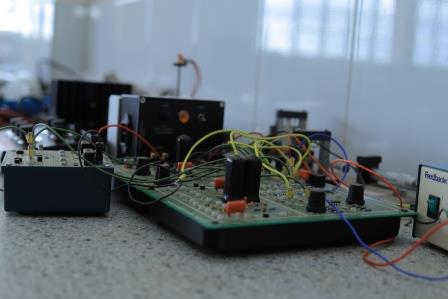Bachelor of Science in Computer Engineering
 Program Overview
Program Overview
Whether you’re interested in Information Technology, Computer Engineering, Personal and Wireless Communications, Robotics, Imaging Technologies, Electric and Electronics, this incorporated, flexible, project-based and hands-on curriculum will provide you with the education and the skills you need to succeed in your career. One of the major focuses of Computer Engineering program is to produce entrepreneurship-oriented graduates who are capable of propping up new companies, out of the prototypes that they will have developed at the undergraduate level. This demands that the final year projects should benchmark world class standards, capable of leading to Computer Engineering and Information & Communication Technology`s incubations. Computer Engineering is concerned with the design and construction of computers and computer-based systems. Note that computers and computer based systems are made up of both software and hardware components. Therefore, Computer Engineering focuses on both types of components.
The mission of the Computer Engineering program is to enable the students to make significant and substantive contributions to solving Computer Engineering problems throughout the students’ professional career. These students will be able to contribute to filling the existing gap in computing curricula most especially at workforce levels.
The Bachelor of Science in Computer Engineering Degree Programme is offered to give an opportunity to prospective students to undertake training in computer engineering at a bachelor’s degree level within Uganda. With the growth of the ICT sector in Uganda, there is need to produce graduates who stimulate the ICT industry with special focus on hardware engineering, software engineering and data communications engineering. This in turn will stimulate the setting up of computer assembling/ manufacturing plants and software development companies within the country. This will lead to job creation and socio-economic growth of the ICT sector. It is designed to give students a thorough knowledge of the field and to provide an enduring foundation for future professional growth. The programme blends theory and practice into a learning experience that develops skills applicable to complex real-world problems in the field of computer engineering.
Engineering is one of the major driving forces of development, and computerization is at the forefront of revolutionizing all aspects of life. Hence the need for a Computer Engineering program that is designed to offer training in a well-balanced combination of hardware, software, and networks skills required to stimulate and sustain the ICT industry that involves the assembly/ manufacturing of computer-based medical systems, development of software, design and installation of optimum computer networks, and maintenance of both hardware and software. This curriculum aims to add course units that address the economic, developmental, medical and technical needs of Uganda and of the region, and shall produce graduates who have practical, technical and business skills they need to support the ICT industry, and/or start up their own ICT businesses. This will lead to job creation and socio-economic growth of the ICT sector. The Poverty Eradication Strategy of the Uganda’s Poverty Eradication Action Plan (PEAP) is based on an economic model that is driven by three factors, namely: Accumulation of skilled human resource, accumulation of capital, and shifting of labor from agriculture to manufacturing. Therefore, the program proposed in this proposal is in line with this strategy.
